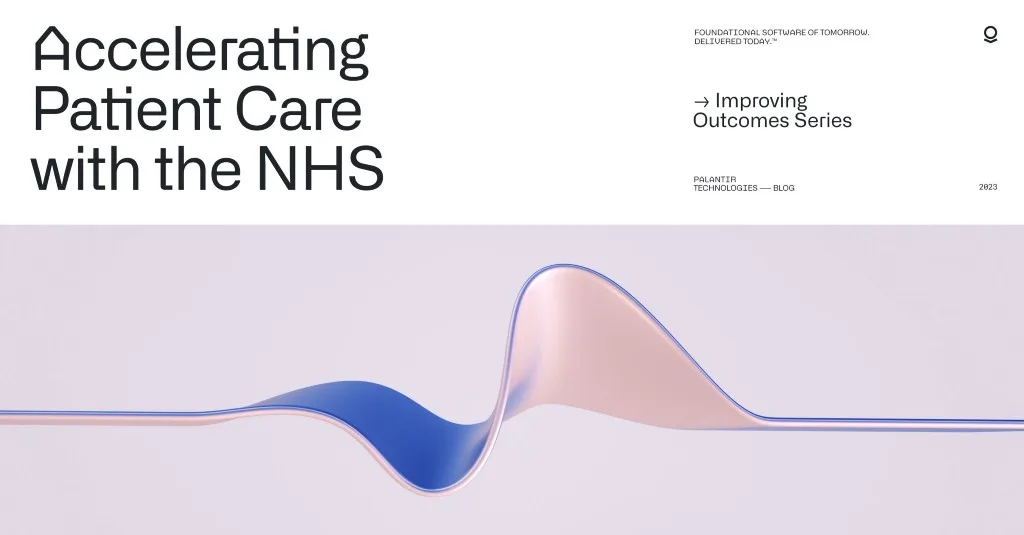
In 2022, we began working at Chelsea and Westminster Hospital to reduce waiting times for cancer treatment. The early results of this work were highlighted in an article in The Times which has led to some further questions about what this work entails. Below, Joanna Peller and Tom McArdle, who lead our UK Health team at Palantir, provide a simple explainer.
How does this cancer pathway work fit into Palantir’s ongoing collaboration with the NHS?
We originally supported NHS England in its response to the Covid-19 pandemic. By helping to ensure ventilators and PPE were delivered to the right place at the right time and supporting the vaccine rollout, we are proud to have contributed to what has widely been acknowledged as the most successful programme in Europe.
The pandemic significantly impacted the amount of planned care that NHS England could provide, and since February 2021, we’ve been providing support to a group of NHS Trusts to drive efficiencies and reduce elective waiting lists.
In practice, this involves the development and deployment of our software, Palantir Foundry, that can help make sense of disparate, siloed data so that NHS England staff can make better, more informed decisions. It also requires strict privacy and security safeguards to ensure that the right people have access to such data at the right time, and only for the approved purposes, they need to provide care.
This work delivers a range of benefits. Not only does it create a clear picture of demand and capacity, it also allows for optimisation of theatre schedules, facilitating more planned care to take place and reducing the time that clinicians spend on administrative tasks. Powerfully, it has also helped accelerate both the diagnosis and treatment of patients across the cancer pathway.
Where are these kinds of results being seen?
At Palantir, we collaborate with our partners to co-build solutions that reflect their reality on the ground. Developing the cancer pathway solution was no different. At Chelsea and Westminster NHS Foundation Trust, we worked alongside clinicians to refine the solution, ensuring it could serve the needs of Trusts across the country.
You can read more about our broader work at Chelsea and Westminster in this article. In February 2022, NHS England spoke of our collaboration on the planned care backlog in its Delivery plan for tackling the COVID-19 backlog of elective care:
“So far the solution has enabled a 28% reduction in the inpatient waiting list (both RTT and non-RTT) through validation and better clinical oversight. Booking lead times have almost tripled, from 6 to 17+ days on average, meaning that patients can be notified to come for surgery in a more timely manner, reducing the number of cancellations due to lack of staff or patient availability. Over the past three month period, theatre utilisation has improved from 73% to 86%.”
Additionally, representatives from other Trusts have described their experiences co-building with Palantir, including Cara Williams, Chief Digital Information Officer at the Countess of Chester Hospital:
“In terms of our in-patient waiting list, we’ve had a 23% impact on that. The platform has been a real success in helping to clean up our waiting list and ensuring that the data is as clean as it could be and that’s all in preparation for theatre utilisation and making sure we’re making best use of our theatre space.”
How exactly do Trusts use Foundry to manage cancer pathways?
Guiding patients through a suspected cancer pathway is typically a labour intensive and time consuming manual administrative process, requiring staff to pull together information from a variety of clinical systems.
Developed with learnings from the planned care backlog collaboration, the cancer pathways solution on Foundry brings together multiple near real-time data feeds into one central, harmonised view, ensuring the most up-to-date information is available to appropriate care professionals and administrators alike. This speeds up the scheduling of appointments and diagnostic tests and reduces the margin for clerical error.
As The Times reports, this has resulted in “patients with suspected cancer now have their first appointment on average two days sooner.” For clinicians, patient progress meetings are also shorter and more efficient, freeing up vital time to relay results and determine next steps of care with their patients.
What are the implications of this work when it comes to protection of patients’ personal data?
As we explained in a previous blog, Palantir is a software company, not a data company. This distinction is crucial. It means that we build software products that our customers, in this case NHS England, use to integrate, harmonise, and understand their data. Unlike many other technology companies, our business model does not, and has never, involved collecting, using or selling personal data.
Only those working directly with a customer can be granted access to relevant customer data. Who, if anyone, receives such access is dictated entirely by each customer, and is only for the strictly defined purposes, conditions, and lengths of time they specify.
Does Palantir’s collaboration with the NHS take place in the UK?
Yes. Palantir’s provision of software solutions for NHS England is firmly rooted in the UK, home to more than 900 employees and our R&D hub. We are incredibly proud of the support our software has provided to date — it has saved lives and improved health outcomes.
Interested in learning more about our work in healthcare? Read more about Palantir’s commitment to improving lives across the healthcare value chain here.
Accelerating Patient Care with the NHS was originally published in Palantir Blog on Medium, where people are continuing the conversation by highlighting and responding to this story.
